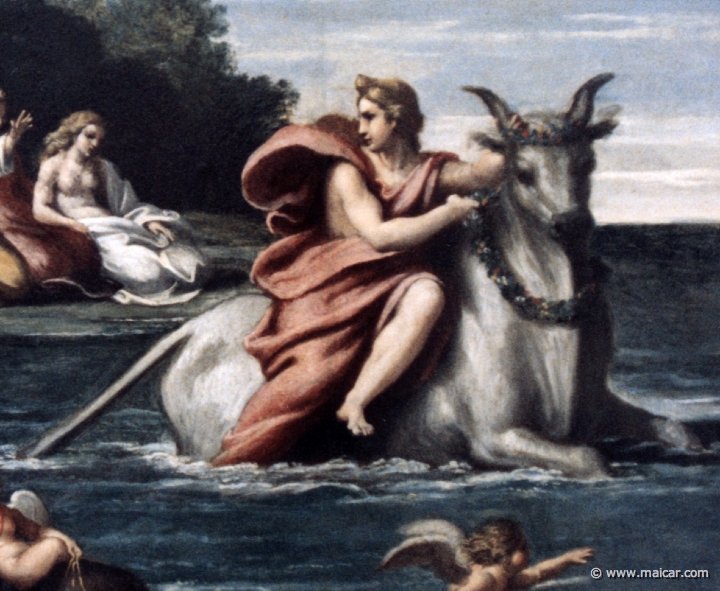|

|
0816: The abduction of Europa. Painting by Antonio Carracci, 1583-1618. Pinacoteca Nazionale, Bologna.
|
|
|
"Ye coasts, pray tell my
loving father that Europa has left her native land,
seated upon a bull, my ravisher, my sailor, and as
I think, my bed-fellow." (Europa. Nonnus, Dionysiaca 1.130).
|
|
Europa was carried off from Phoenicia to Crete, and was never found
by the Phoenician relatives who sought her.
Europa's family
Some say that the father of this Phoenician princess was Agenor 1, but others say that it was Phoenix 1, who some claim was her brother. Agenor 1 was by birth an Egyptian, but he departed to Phoenicia and reigned there. According to some Agenor 1 is the son of Poseidon and Libya, but others affirm that his parents were Belus 1 and Anchinoe.
King Belus 1 of Egypt was son of Poseidon and Libya, and was also the father of Aegyptus 1 and Danaus 1 (see DANAIDS). His mother Libya was, in turn, daughter of Epaphus 1 and Memphis 2. And King Epaphus 1 of Egypt, from whom sprang the Libyans and the Ethiopians, was the founder of the city of Memphis in Egypt and the son of Zeus and Io, the girl who was once
turned into a cow, but who is one of the Three Main
Ancestors.
If Phoenix 1 would be considered to be the father of Europa, everything would amount to the same, because Phoenix 1, after whom Phoenicia is called, is said to be the son either of Agenor 1 or of Belus 1, and we would, also in this way, arrive to Io. Nothing is known about
Europa's presumptive mothers.
The Bull
Some say that Zeus turned himself into a Bull, mounted Europa on his
back, and conveyed her through the sea from
Phoenicia to Crete. But
others say that the Bull who carried Europa was the
same Cretan Bull that Heracles 1 enjoined in
one of his LABOURS, which
in turn could be the same Bull, that was sent by Poseidon to King Minos 2 of Crete, and that later,
consorting with the king's wife Pasiphae, became
the progenitor of the Minotaur.
The search for Europa
When Europa disappeared on the back of the Bull, Agenor 1 sent out his sons in search of her, ordering them not to return until they had found their sister. That is how Cilix, Europa's brother, ended up in
Cilicia in Asia Minor, a region called after him,
where he became king after giving up the search. Cadmus, another of
Europa's brothers, went with his mother Telephassa
to Thrace, where he stayed for some time, before
coming to Boeotia, where he founded the city of
Cadmea, which was later called Thebes. For when
Telephassa died, Cadmus went to Delphi to inquire
about Europa, and the Oracle told him not to worry
about her sister, but instead, following a cow,
found a city wherever the animal would lay down to
rest. And the cow rested in the spot where today
the ciy of Thebes is. Another brother, Thasus, having sailed from
Tyre, gave up the search and settled in an island
off Thrace where he founded a city Thasus, called
after himself. Europa's brother Phoenix 1 set out for Africa, and because he remained there, the Africans were called Phoenicians.
Europa marries
After having children with Zeus, Europa married Asterius 3, son of Tectamus, son of Dorus 1, son of Hellen 1, son of Deucalion 1, the man
who survived the Flood.
Tectamus had sailed to Crete with Aeolians and
Pelasgians, becoming on his arrival king of the
island. It is during the time when he was king of Crete that Zeus carried off Europa from Phoenicia. Tectamus' mother was daughter of Cretheus 1, son of Aeolus 1, brother of Dorus 1. Zeus gave Europa presents. One of them was a wonderful dog calle Laelaps 2 which was so swift that no beast could escape it. He also gave her Talos 1, a creature made
of bronze, who was meant to be the warder of Crete. When after some time Cadmus, now king of
Cadmea (the future Thebes) married Harmonia 1, daughter either of Ares and Aphrodite, or of Zeus and Electra 3 (the Pleiad), he gave his new wife a Robe and a Necklace as wedding presents (see Robe & Necklace of Harmonia 1), and some say that the Necklace was given by Europa, who had received it from Zeus. That
is probably the last time someone heard of Europa,
and her death was never reported.
After her time
After Asterius 3, Minos 1 became king of Crete, and after him his son Lycastus 1. After Lycastus 1, Minos 2 came to the throne, and when he died, Idomeneus 1 became king of Crete. Idomeneus 1 left his country in order to fight in the Trojan War, but when he returned from the war, an usurper Leucus 1 had taken the kingdom. Idomeneus 1 could not land in Crete and sailed for
Italy. |